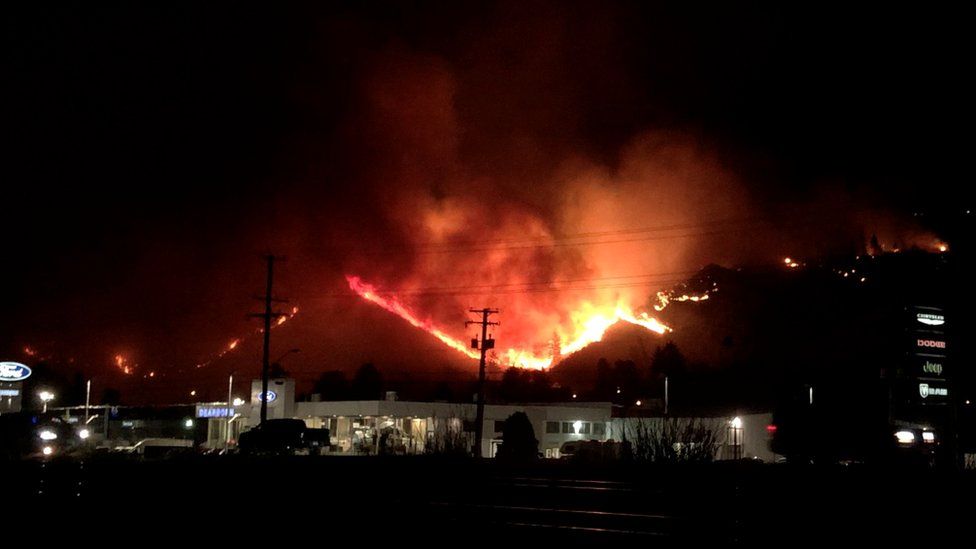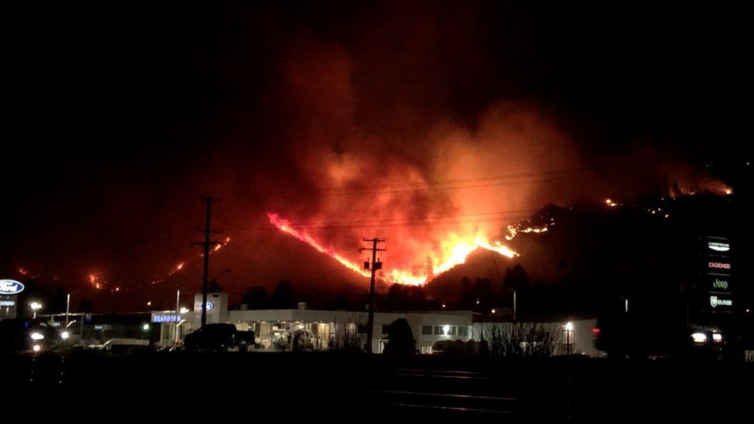More than 130 wildfires - fuelled by lightning strikes - are burning across western Canada following a record-breaking heatwave.
Canada's federal government said it would send military aircraft to help emergency workers battling to control the fires in British Columbia.
Earlier this week, people had to flee the village of Lytton in the province.
Lytton, which recorded Canada's highest ever temperature of 49.6C (121.3F) on Tuesday, was destroyed by fire.
The blaze in the village - about 260km (160 miles) north-east of Vancouver - forced many of its 250 residents to leave without their belongings on Wednesday evening.
"Within about 15 minutes the whole town was engulfed in flames," Mayor Jan Polderman told the BBC.
Abnormally high temperatures have been recorded in swathes of North America in recent days.
Experts say that climate change is expected to increase the frequency of extreme weather events, such as heatwaves. However, linking any single event to global warming is complicated.
On Friday, the British Columbia Wildfire Service said that 136 fires were active across the province following some 12,000 lightning strikes the previous day.
Hundreds of people have been warned they may have to leave their homes.

Canada's Defence Minister Harjit Sajjan said the government would provide aid, including military helicopters and personnel, to help tackle the fires and reach people threatened by the flames.
The blazes have forced the closure of a number of major roads.
Public Safety Minister Bill Blair said the weather and the wildfires were having a "devastating" and "unprecedented" impact on British Columbia.
"These wildfires show that we are in the earliest stages of what promises to be a long and challenging summer," he said.
Health officials say extreme heat is likely to have contributed to 719 sudden deaths over the past week.
"Many of the deaths experienced over the past week were among older individuals living alone in private residences with minimal ventilation," Chief Coroner Lisa Lapointe said in a statement.
Temperatures have been easing in coastal areas of Canada, but there is not much respite for inland regions. The British Columbia Wildfire Service said it was bracing for more wildfires throughout the weekend.
Latest Stories
-
Expansion Drive: Takoradi Technical University increases faculties
1 hour -
SHS heads demand payment of outstanding funds before reopening of schools
2 hours -
We thank God for the 2024 general elections – Akufo-Addo
2 hours -
Coconut Grove Beach Resort marks 30 years of excellence with memorable 9 lessons & carols service
2 hours -
WAFU B U-17 Girls’ Cup: Black Maidens beat Nigeria on penalties to win inaugral tournament
3 hours -
Real Madrid beat Sevilla to keep pressure on leaders Atletico
4 hours -
Liverpool put six past Spurs to go four points clear
4 hours -
Manchester United lose 3-0 at home to Bournemouth yet again
4 hours -
CHAN 2024Q: ‘It’s still an open game’ – Didi on Ghana’s draw with Nigeria
4 hours -
CHAN 2024Q: Ghana’s Black Galaxies held by Nigeria in first-leg tie
5 hours -
Dr Nduom hopeful defunct GN bank will be restored under Mahama administration
6 hours -
Bridget Bonnie celebrates NDC Victory, champions hope for women and youth
6 hours -
Shamima Muslim urges youth to lead Ghana’s renewal at 18Plus4NDC anniversary
7 hours -
Akufo-Addo condemns post-election violence, blames NDC
7 hours -
DAMC, Free Food Company, to distribute 10,000 packs of food to street kids
8 hours

